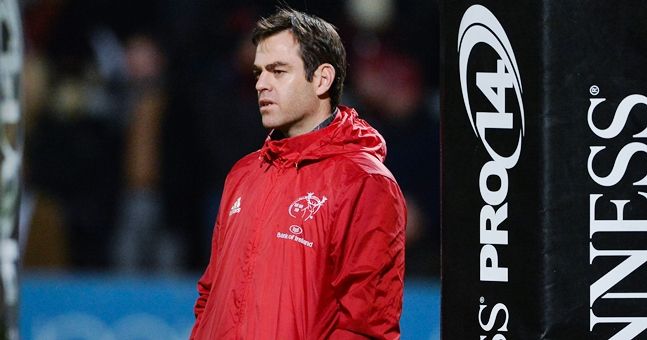

Share
11th January 2018
12:47pm GMT

'The South African duo of Keynon Knox and Matt Moore, both 18, recently linked up with Peter Malone’s charges after completing their schools rugby with Michaelhouse and St Andrew’s College respectively. Knox, a tighthead prop, and Moore who plays centre and fullback, are training with the first year academy recruits.'Knox is coming from a prestigious South African school that has produced the likes of Ruan Combrinck and Pat Lambie in recent years, while one of the most famous rugby names from St Andrew's College is former South Africa and Italy coach Nick Mallet. A notable piece of information, from the release, is that both players are already in with the Munster academy. That means they got in with the province before December 31, 2017 and, all going well for them, they will be Irish Qualified within three years.
 This has caused grumbling in certain quarters, with two key complaints being the South African influx to the province and young players being targeted and brought in just before World Rugby's residency requirements change from three to five years.
As soon as World Rugby announced the rule change, clubs the world over will have been working out the angles. Having fallen back on bulking out their squads, and plucking the occasional diamond, by using the three-year residency rule, the change will now see clubs (and provinces) simply bring in younger prospects and hope for the best.
More and Knox are fortunate that they will be Irish Qualified players by January 2021 but they will surely not be the last teenage players brought in by Irish provinces in the hopes of making the break-through on foreign shores.
Changing a rule will, more often than not, see rugby sides alter their own plans and finding ways around issues. Expect to see the provinces move away from bringing in the likes of Bundee Aki [24 when he signed for Connacht] and James Lowe [25 when he arrived at Leinster] in the coming years.
For the foreseeable future, clubs will take educated guesses and look to bring in young players that have a chance of breaking through to their senior squad. The optics may not be great but the same principle as established signings will hopefully apply - they will have to be exceptional and considerably better than their Irish equivalent to get game-time.
The big risk here is for the player himself. More and Knox have packed up their lives in South Africa and are backing themselves to make it in this country. If they fail, they may be left at 21 or 22 needing to figure out that tough, next step miles and miles from home.
One hopes there is not a huge influx of young, foreign imports but my stance on the likes of Munster newest academy members would be the same as it is for the likes of Aki, Lowe, Jared Payne, CJ Stander and more of our recent imports.
As long as they are full invested, hard-working, engage with the wider community, are an asset to their team and are contributing to society, they are entitled to be called Irish.
Handy, still, that Munster's new lads have some familiar accents around the province's U.L headquarters to help them settle in.
This has caused grumbling in certain quarters, with two key complaints being the South African influx to the province and young players being targeted and brought in just before World Rugby's residency requirements change from three to five years.
As soon as World Rugby announced the rule change, clubs the world over will have been working out the angles. Having fallen back on bulking out their squads, and plucking the occasional diamond, by using the three-year residency rule, the change will now see clubs (and provinces) simply bring in younger prospects and hope for the best.
More and Knox are fortunate that they will be Irish Qualified players by January 2021 but they will surely not be the last teenage players brought in by Irish provinces in the hopes of making the break-through on foreign shores.
Changing a rule will, more often than not, see rugby sides alter their own plans and finding ways around issues. Expect to see the provinces move away from bringing in the likes of Bundee Aki [24 when he signed for Connacht] and James Lowe [25 when he arrived at Leinster] in the coming years.
For the foreseeable future, clubs will take educated guesses and look to bring in young players that have a chance of breaking through to their senior squad. The optics may not be great but the same principle as established signings will hopefully apply - they will have to be exceptional and considerably better than their Irish equivalent to get game-time.
The big risk here is for the player himself. More and Knox have packed up their lives in South Africa and are backing themselves to make it in this country. If they fail, they may be left at 21 or 22 needing to figure out that tough, next step miles and miles from home.
One hopes there is not a huge influx of young, foreign imports but my stance on the likes of Munster newest academy members would be the same as it is for the likes of Aki, Lowe, Jared Payne, CJ Stander and more of our recent imports.
As long as they are full invested, hard-working, engage with the wider community, are an asset to their team and are contributing to society, they are entitled to be called Irish.
Handy, still, that Munster's new lads have some familiar accents around the province's U.L headquarters to help them settle in.Explore more on these topics: